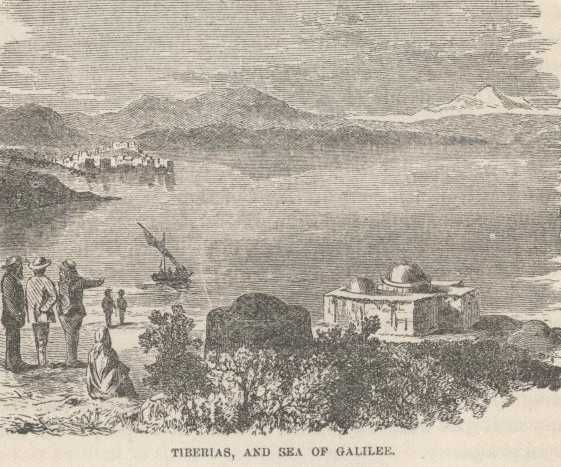We are camped in this place, now, just within the city walls of Tiberias. We went into the town before nightfall and looked at its people—we cared nothing about its houses. Its people are best examined at a distance. They are particularly uncomely Jews, Arabs, and negroes. Squalor and poverty are the pride of Tiberias. The young women wear their dower strung upon a strong wire that curves downward from the top of the head to the jaw—Turkish silver coins which they have raked together or inherited. Most of these maidens were not wealthy, but some few had been very kindly dealt with by fortune. I saw heiresses there worth, in their own right—worth, well, I suppose I might venture to say, as much as nine dollars and a half. But such cases are rare. When you come across one of these, she naturally puts on airs. She will not ask for bucksheesh. She will not even permit of undue familiarity. She assumes a crushing dignity and goes on serenely practicing with her fine-tooth comb and quoting poetry just the same as if you were not present at all. Some people can not stand prosperity.
They say that the long-nosed, lanky, dyspeptic-looking body-snatchers, with the indescribable hats on, and a long curl dangling down in front of each ear, are the old, familiar, self-righteous Pharisees we read of in the Scriptures. Verily, they look it. Judging merely by their general style, and without other evidence, one might easily suspect that self-righteousness was their specialty.

From various authorities I have culled information concerning Tiberias. It was built by Herod Antipas, the murderer of John the Baptist, and named after the Emperor Tiberius. It is believed that it stands upon the site of what must have been, ages ago, a city of considerable architectural pretensions, judging by the fine porphyry pillars that are scattered through Tiberias and down the lake shore southward. These were fluted, once, and yet, although the stone is about as hard as iron, the flutings are almost worn away. These pillars are small, and doubtless the edifices they adorned were distinguished more for elegance than grandeur. This modern town—Tiberias—is only mentioned in the New Testament; never in the Old.
The Sanhedrim met here last, and for three hundred years Tiberias was the metropolis of the Jews in Palestine. It is one of the four holy cities of the Israelites, and is to them what Mecca is to the Mohammedan and Jerusalem to the Christian. It has been the abiding place of many learned and famous Jewish rabbins. They lie buried here, and near them lie also twenty-five thousand of their faith who traveled far to be near them while they lived and lie with them when they died. The great Rabbi Ben Israel spent three years here in the early part of the third century. He is dead, now.